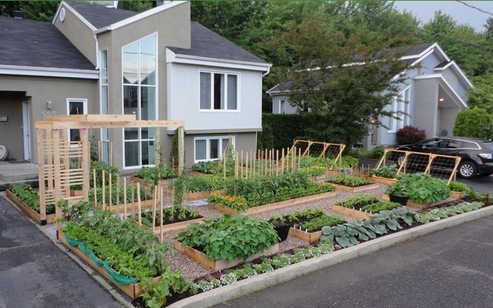That's a lovely house, don't you think? And a nice yard in front of it.But Drummondville, Qe. (about 100 km NE of Montreal) doesn't seem to think so. After apparently getting a verbal approval from the town's Environmental Inspector,
CBC reports that the couple who planted this lovely garden were served with a notice that they had to tear it out within 7 days or face fines of between $100 and $300 a day.
A
follow-up report notes that the tear-out date has been extended to 01 September. It also notes that "Drummondville plans to make it illegal to grow vegetables on front lawns anywhere in the city." Apparently the city "held public consultations on the new rule and it said no one objected."
This is the beginning of push back; expect to see more and more of this. I expect it will be framed as a "property values" argument, and be claimed as being non-discriminatory because the new bylaws will affect everyone the same way (ask the residents of Africville how that worked out for them...). Drummondville is saying that a 30% grass rule already exists--from the look of the above photo, sodding the paths would come close to taking care of that requirement).
In the US, things are the same. According to
an article in Grist, push back is occuring there too:
[In] Tulsa [they] bulldozed the entire thing.
If you start looking for stories like these, you’ll turn them up in droves. In 2010, Clarkston, Ga., fined a gardener
named Steve Miller for planting too many vegetables. In 2011, Oak Park,
Mich., told Julie Bass she couldn’t grow any vegetables in her front
yard because vegetables weren’t “suitable” yard plants. (“You can look
all throughout the city and you’ll never find another vegetable garden
that consumes the entire front yard,” a city official told the local TV station.) And in Chatham, N.J., Mike Bucuk, a young would-be organic farmer, had to fight with the entire town just to grow some vegetables his family’s property.
Gardens are productive. They serve a purpose, and part of that purpose leads to reduced sales for some businesses (fresh produce markets, or farmer's markets, often face stiff opposition from major supermarket players. Here in BC, Save-On Foods is supposed to be one of the big anti-farmer's-market forces).
But home gardens breed neither fear nor consumption, the two major drivers of modern society. They encourage independence and self-reliance, neither of which sells industrial food. In fact, farmer's markets and home gardens produce exactly what the industrial food system
cannot supply: good quality, good tasting produce.
And don't kid yourself. Industrial food will fight back against the home producers, the small and alternative producers. They have to--their business model is based on compliance, on being unable to see any alternatives. Local food has scared them (there are various talking heads that have produced "studies" showing that best-case New Zealand lamb has a smaller carbon footprint than worst-case local lamb, for instance). Industrial food already sends a private police force into the Canadian prairies to see what you're growing and if they can put a stop to it (check out the
Percy Schmeiser story, as one example). Industrial food will continue to follow the Big Tobacco playbook to slow the challenge to its business. Like Big Tobacco, there are billions of dollars a year at stake as long as they can keep us solitary, afraid, and dependent. The solution is straightforward: be fearless (read
Farm city : the education of an urban farmer by
Novella Carpenter, or
her blog).
Form community. Grow, raise, or produce anything of your own. Its not your job to keep Industrial Agriculture on the top of the food chain. Its your job to do what's best for you, your family and community, and the planet.


